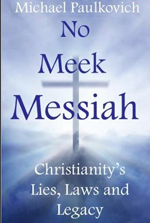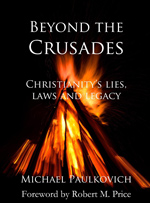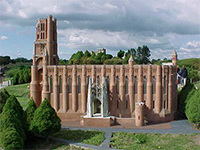
Discuss the world's favourite imaginary friend on the JNE YouTube channel
Beyond the Crusades
Christianity's Lies, Laws, and Legacy
Michael Paulkovich
Foreword by Robert M. Price
Published by American Atheist Press, Cranford, NJ.
Jesus the 5th grader
Jesus believed in Noah's Ark, Adam and Eve, Jonah living in a fish, and Lot's wife turning into salt. Jesus believed "devils" cause illness, and even bought into the OT notion that a magical pole proffered by the OT could cure snakebites merely by gazing upon it.
Was Jesus smarter than a fifth grader?
Athenagoras was a pious early Christian, unaware of Jesus!
A Tragic Decision
In 391 CE Roman Emperor Theodosius elevates Jesus to divinity, declaring Christianity the only "legitimate" religion of the world, under penalty of death. The ancient myth is rendered law. This decision by Theodosius is possibly the worst ever made in human history.
Christianity was the only legal cult of the empire, and for the next 1500 years, good Christians would murder all non-Christians they could find by the tens of millions.
Desperate egotist
The mythical Jesus character is portrayed as a pitiful man in desperate need of praise: "He that loveth father or mother more than me is not worthy of me: and he that loveth son or daughter more than me is not worthy of me." - Matt 10:37.
This "meek" messiah boasted he was "greater than Solomon" (Mt 12:42), saying he "came not to send peace, but a sword" (Mt 10:34), and "to send fire on the earth" (Lk 12:49).
Acquisitions
The Christian colossus annexed much of the beautiful Languedoc region of France - some for the Church, some for northern French nobles.
The extravagant Palais de la Berbie (construction began in 1228) and the Catholic fortress-cathedral Sainte Cécile (began 1282) are just two examples that remain to this day.
Palais de la Berbie in Albi, France
Fortress-cathedral Sainte Cécile
Christianity has an incalculable amount of blood on its hands.
No Meek Messiah: Christianity's Lies, Laws and Legacy Most historians hold the position I had once harbored as true, being a Bible skeptic but not a Christ mythicist. I had maintained that the Jesus person probably existed, having fantastic and impossible stories later foisted upon his earthly life, passed by oral tradition then recorded many decades after Jesus lived. After exhaustive research for my first book, I began to perceive both the brilliance and darkness from history. I discovered that many early Christian fathers believed with all pious sincerity their savior never came to earth—or when he did, it was Star-Trekian style, beamed down pre-haloed and fully-grown, sans transvaginal egress. Moreover I expose many other startling bombshells in my book No Meek Messiah. I embarked upon one exercise to revive research into Jesus-era writers who should have recorded Christ tales, but did not. John Remsburg enumerated forty-one "silent" historians in his book The Christ (1909). I dedicated months of research to augment Remsburg's list, finally tripling his count. In No Meek Messiah I provide a list of 126 writers who should have recorded something of Jesus, with exhaustive references. Perhaps the most bewildering "silent one" is the mythical super-savior himself, Jesus the Son of God ostensibly sent on a suicide mission to save us from the childish notion of "Adam's Transgression" as we learn from Romans 5:14. The Jesus character is a phantom of a wisp of a personage who never wrote anything. So, add one more: 127.
The Jesus character is a phantom of a wisp of a personage who never wrote anything. Was Jesus smarter than a fifth grader? But perhaps no man is more fascinating than Apollonius Tyanus, saintly first century adventurer and noble paladin. Apollonius was a magic-man of divine birth who cured the sick and blind, cleansed entire cities of plague, foretold the future and fed the masses. He was worshiped as a god, and son of god. Despite such nonsense claims, Apollonius was a real man recorded by reliable sources. As Jesus ostensibly performed miracles of global expanse (e.g. Mt 27), his words going "unto the ends of the whole world" (Rom 10), one would expect virtually every literate person on earth to record those events during his time. A Jesus contemporary such as Apollonius should have done so, as well as those who wrote of Apollonius. Such is not the case. In Philostratus' third century chronicle, Vita Apollonii, there is no hint of Jesus. Nor in the works of other Apollonius epistolarians and scriveners: Emperor Titus, Cassius Dio, Maximus, Moeragenes, Lucian, Soterichus Oasites, Euphrates, Marcus Aurelius, or Damis of Hierapolis. It seems none of these writers from first to third century ever heard of Jesus, global miracles and alleged worldwide fame be damned. Another bewildering author is Philo of Alexandria. He spent his first century life in the Levant, even traversing Jesus-land. Philo chronicled Jesus contemporaries—Bassus, Pilate, Tiberius, Sejanus, Caligula—yet knew nothing of the storied prophet and rabble-rouser enveloped in glory and astral marvels. Historian Josephus published Jewish Wars c. 95. He had lived in Japhia, one mile from Nazareth—yet Josephus seems to have been unaware of both Nazareth and Jesus. (I devoted a chapter to his interpolated works, pp. 191-198.) You may encounter Christian apologists claiming that Pliny the Younger, Tacitus, Suetonius, Phlegon, Thallus, Mara bar-Serapion, or Lucian wrote of Jesus contemporary to the time. In No Meek Messiah I thoroughly debunk such notions. The Bible venerates the artist formerly known as Saul of Tarsus, an "apostle" essentially oblivious to his heavenly savior. Paul is unaware of the virgin mother, and ignorant of Jesus' nativity, parentage, life events, ministry, miracles, apostles, betrayal, trial and harrowing passion. Paul knows neither where nor when Jesus lived, and considers the crucifixion metaphorical (Gal 2:19-20). Unlike the absurd Gospels, Paul never indicates Jesus had been to earth. And the "five hundred witnesses" claim (1 Cor 15) is a well-known forgery. Qumran, the stony and chalky hiding place for the Dead Sea Scrolls lies twelve miles from Bethlehem. The scroll writers, coeval and abutting the holiest of hamlets one jaunty jog eastward never heard of Jesus. Dr. Jodi Magness wrote, "Contrary to claims made by a few scholars, no copies of the New Testament (or precursors to it) are represented among the Dead Sea Scrolls." Christianity was still wet behind its primitive and mythical ears in the second century, and Christian father Marcion of Pontus in 144 CE denied any virgin birth or childhood for Christ—Jesus' infant circumcision (Lk 2:21) was thus a lie, as well as the crucifixion! Marcion claimed Luke was corrupted, and his savior self-spawned in omnipresence, a spirit without a body (see Dungan, 43). Reading the works of second century Christian father Athenagoras, one never encounters the word Jesus (or Ἰησοῦς or Ἰησοῦν, as he would have written)—Athenagoras was thus unacquainted with the name of his savior it would seem. Athenagoras was another pious early Christian, unaware of Jesus (see also Barnard, 56). The original booklet given the name "Mark" ended at 16:8, later forgers adding the fanciful resurrection tale (see Ehrman, 48). The booklet "John" in chapter 21 also describes post-death Jesus tales, another well-known and well-documented forgery (see Encyclopedia Biblica, vol. 2, 2543). Millions should have heard of the Jesus "crucifixion" with its astral enchantments: zombie armies and meteorological marvels (Mt 27) recorded not by any historian, but only in the dubitable scriptures scribbled decades later by superstitious yokels. The Jesus saga is further deflated by the reality of Nazareth, having no settlement until after the 70 CE war—suspiciously around the time the Gospels were concocted, as René Salm demonstrates in his book. I also include in my book similarities of Jesus to earlier God-sons, too striking to disregard. The Oxford Classical Dictionary and Catholic Encyclopedia, as well as many others, corroborate. Quite a few son-of-gods myths existed before the Jesus tales, with startling similarities, usually of virgin mothers, magical births and resurrection: Sandan, Mithra, Horus, Attis, Buddha, Dionysus, Krishna, Hercules, Isiris, Orpheus, Adonis, Prometheus, etc.
The One True Religion If you encounter a Christian defending her faith purely based on its popularity, you would do well to inform her that Christianity was a very minor cult in the fourth century, while "pagan" religions, especially Mithraism, were much more popular in the Empire – and the Jesus cult would have faded into oblivion if not for an imperial decree.
Frauds and Forgeries Along the centuries the Church has sought to gain power and wealth, and No Meek Messiah exposes their many scams and deceits and obfuscations in detail including:
The Good that Jesus Brought Early Christians believed all necessary knowledge was in the Bible and thus closed down schools, burned books, forbade teaching philosophy and destroyed libraries. The Jesus person portrayed in the Bible taught that "devils" and "sin" cause illness, and thus for some 1700 years good Christians ignored science and medicine to perform exorcisms on the ill. The Bible decrees "Thou shalt not suffer a witch to live" (Ex 22:18, with support from Dt 18:10-12, Lev 20:27, 2 Chr 33:6, Micah 5:12, and 1 Sam 28:3). In the New Testament, Paul in Galatians 5:19-21 joins the anti-witchcraft credo. But let's face it: Paul claims to be a devoted Hebrew, full of credulity and misogyny. Paul will "suffer not a woman to teach" and thus along the centuries women have been second-class citizens, especially within the church. These juvenile and immoral Bible edicts are not left in the past.
Gentle and Meek and Mythical I personally know several Christians who accept evolution as scientific fact. Okay, they kind of ignore the Old Testament,but I asked one born again Christian about the genealogy of Jesus and she was only aware of Matthew, unfamiliar with another one in Luke.
This Jesus character speaks highly of father Yahweh's genocidal tantrums in Matthew 11:20-24. Jesus is referring to the book of Joshua where his father declares he will wipe out all people of Sidon: "All the inhabitants of the hill country from Lebanon unto Misrephoth-maim, and all the Sidonians, them will I drive out from before the children of Israel" (13:6). You may have heard Christians claim that the only "god hates fags" verbiage comes from the Old Testament (Lev 18:22), but both Paul (in Rom 1:26-27) and Jesus speak out against it, as the J-man praises the ruin of Gaytown, Canaan: "But the same day that Lot went out of Sodom it rained fire and brimstone from heaven and destroyed them all." -Luke 17:29.
Onward Christian Soldiers Christianity has a violent "holy book" as its authority, granting followers supremacy over the entire earth (e.g. Gen 1:28) which they used to justify land grabs, genocide and holy conflicts. The following wars were perpetrated by Christians in the name of their savior:
Yet malefic sounds of sibilance emanated only from the Vatican, and not from its contrived enemies living peaceably in France with their pure and righteous ways. The Church murdered over a million innocent Cathars over the period of 35 years—men, women, children. Christian forces wiped them from the face of the planet. At the height of the siege, Christian forces were burning hundreds at the stake at a time. The Christian colossus exterminated them, then annexed much of Languedoc—some for the Church, some from northern French nobles. The extravagant Palais de la Berbie (construction began in 1228) and the Catholic fortress-cathedral Sainte Cécile (began 1282) are just two examples that remain to this day.
When I consider those 126 writers, all of whom should have heard of Jesus but did not, and Paul and Marcion and Athenagoras and Matthew with a tetralogy of opposing Christs, the silence from Qumran and Nazareth and Bethlehem, conflicting Bible stories, and so many other mysteries and omissions, I must conclude this "Jesus Christ" is a mythical character. "Jesus of Nazareth" was nothing more than urban (or desert) legend, likely an agglomeration of several evangelic and deluded rabbis who might have existed. The "Jesus mythicist" position is regarded by Christians as a fringe group. But after my research I tend to side with Remsburg—and Frank Zindler, John M. Allegro, Thomas Paine, Godfrey Higgins, Robert M. Price, Charles Bradlaugh, Gerald Massey, Joseph McCabe, Abner Kneeland, Alvin Boyd Kuhn, Harold Leidner, Peter Jensen, Salomon Reinach, Samuel Lublinski, Charles-François Dupuis, Rudolf Steck, Arthur Drews, Prosper Alfaric, Georges Ory, Tom Harpur, Michael Martin, John Mackinnon Robertson, Alvar Ellegård, David Fitzgerald, Richard Carrier, René Salm, Timothy Freke, Peter Gandy, Barbara Walker, Thomas Brodie, Earl Doherty, Bruno Bauer and others—heretics and iconoclasts and freethinking dunces all, according to "mainstream" Bible scholars. If all this evidence and non-evidence including 126 silent writers cannot convince, I'll wager we will uncover much more. Yet this is but a tiny tip of the mythical Jesus iceberg: nothing adds up for the fable of the Christ. In the Conclusion of No Meek Messiah I summarize the madcap cult of Jesus worship that has plagued the world for centuries. It should be clear to even the most devout and inculcated reader that it is all up for Christianity, and in fact has been so for centuries. Its roots and foundation and rituals are borrowed from ancient cults: there is nothing magical or "God-inspired" about them. The "virgin birth prophecy" as well as the immaculate conception claims are fakeries, the former due to an erroneous translation of the Tanakh, the latter a nineteenth century Catholic apologetic contrivance, a desperate retrofitting. Jesus was no perfect man, no meek or wise messiah: in fact his philosophies were and are largely immoral, often violent, as well as shallow and irrational. There have been many proposed sons of god, and this Jesus person is no more valid or profound than his priestly precursors. In fact, his contemporary Apollonius was unquestionably the superior logician and philosopher. Christianity was a very minor and inconsequential cult founded late in the first century and then—while still quite minor—forced upon all the people of the Empire, and all rival kingdoms in the fourth century and beyond, as enforceable law with papal sanction. Christianity has caused more terror and torture and murder than any similar phenomenon. With its tyrannical preachments and directives for sightless and mindless obedience, the Bible is a violent and utterly useless volume, full of lies and immoral edicts and invented histories, no matter which of the many "versions" you may choose to read—including Thomas Jefferson's radical if gallant abridgment. The time to stop teaching the tall tales and nonsense to children, frightening them with eternal torture administered by God's minions, has long ago passed. Parents who do so are likely deluded, and most surely are guilty of child abuse of the worst sort ... The cult of Christianity has an incalculable amount of blood on its hands. And the "Jesus" tale seems to have been nothing more than oral legend, with plenty of hoax and fraud perpetrated along the ages. It is my hope that mankind will someday grow up and relegate the Jesus tales to the same stewing pile that contains Zeus and his son Hercules, roiling away in their justifiable status as mere myth.
Copyright (c) 2013, Michael Paulkovich, Spillix, LLC
Bibliography Further Reading
Copyright © 2004
by Kenneth Humphreys.
|
||||||||||||||||||||||||||||||||||||||||






